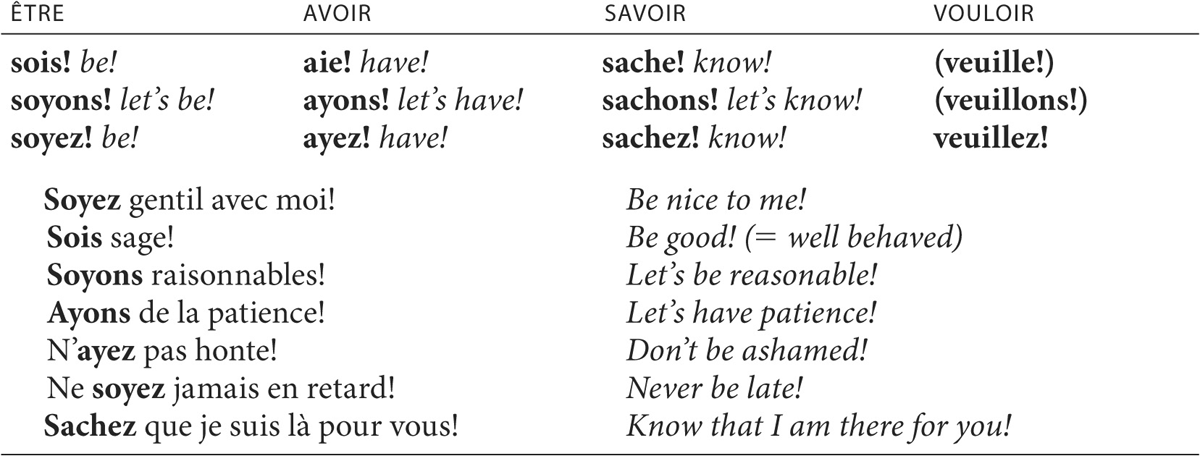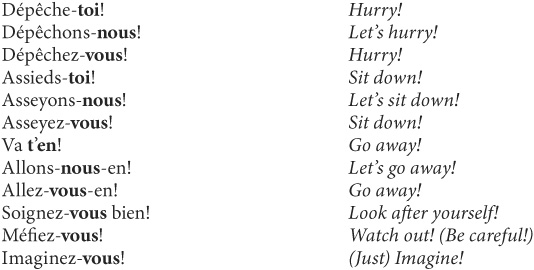
One uses the imperative to give directions, orders, suggestions, and advice. Wait!, Let’s see!, and Don’t forget! are imperatives in English. In French, the imperative has three forms: the second-person singular (which is used to give a command to one person the speaker would address with tu), the first-person plural (which is used to give a command to two or more people including the speaker [nous]), and the second-person plural (which is used to give a command to one person the speaker would address with vous and to any group of people).
To find the imperative, simply take the tu, nous, and vous forms of the present tense and drop the subject pronouns. This rule holds true for all regular and irregular verbs except for être, avoir, savoir, and vouloir, which have irregular imperatives.
Note that with all -er ending verbs—as well as with the verbs ouvrir (to open), souffrir (to suffer), offrir (to offer)—you will also drop the s from the conjugated verb form in the second-person singular to create the imperative.

Note: Regular verbs that show spelling changes in the present indicative conserve these changes in the imperative.

Comment dit-on en français?
1. Listen (pol.)! ____________
2. Slow down (pol.)! ____________
3. Wait (fam.)! ____________
4. Speak (fam.) louder (plus fort)! ____________
5. Speak (pol.) more slowly please! ____________
6. Stay (fam.) here! ____________
7. Pay (fam.) the bill! ____________
8. Buy (fam.) some stamps! ____________
9. Help (pol.) the poor (les pauvres [m.pl.])! ____________
10. Answer (pol.) the question! ____________
11. Try on (fam.) this coat! ____________
12. Continue (pol.) straight ahead, then turn left. ____________
13. Let’s eat at McDonald’s (chez MacDo)! ____________
14. Come in (pol.)! ____________
15. Get home (fam.) safely! ____________
16. Close (pol.) the door! ____________
17. Open (fam.) the window! ____________
18. Ask (pol.) the teacher! ____________
19. Let’s leave! ____________
20. Come here (fam.)! ____________
21. Let’s see! ____________
22. Sleep (fam.) well! ____________
23. Drink (fam.) your milk! ____________
24. Take (fam.) your time! ____________
25. Take (pol.) the second street on the right. ____________
To form the negative imperative, one surrounds the verb with the negative expression: ne… pas, ne… jamais, ne… plus, etc.
EXERCICE
13•2
Comment dit-on en français?
1. Don’t forget (fam.)! ____________________________________
2. Let’s not waste (perdre) our time! _______________________
3. Don’t drive (fam.) so (si) fast! ___________________________
4. Don’t work (fam.) so hard! ______________________________
5. Don’t disobey (fam.)! __________________________________
6. Let’s not travel anymore! _______________________________
7. Let’s not exaggerate (anything)! _________________________
8. Don’t drink (pol.) this water! _____________________________
9. Don’t say anything (pol.)! _______________________________
10. Don’t leave! (fam.)! ____________________________________
11. Don’t (pol.) make any noise! ____________________________
12. Don’t (pol.) laugh! _____________________________________
Four verbs have an irregular imperative; the command forms cannot be derived from the present tense conjugation but must be memorized.

Note: Of the three imperative forms of vouloir, only veuillez is used. The others are extremely rare. The form veuillez is used (followed by an infinitive) in polite requests (meaning please) and in numerous final formulas of formal letters.

EXERCICE
13•3
Comment dit-on en français?
1. Be (fam.) careful! _____________________________________________
2. Be (pol.) good! _______________________________________________
3. Let’s be courageous! _________________________________________
4. Don’t be (fam.) afraid! _________________________________________
5. Have (pol.) courage! __________________________________________
6. Have (fam.) faith (confiance) in me! ____________________________
7. Know (fam.) the truth! _________________________________________
8. Be (fam.) proud! ______________________________________________
9. Don’t be (pol.) late! ___________________________________________
10. Let’s not be disappointed! _____________________________________
11. Please sit down (pol.)! ________________________________________
12. Please leave (pol.) a message after the beep (le bip)! _____________
EXERCICE
13•5
Votre ami(e) vous parle de ses problèmes. Donnez-lui des conseils. (Give advice to your friend who complains about various things.)
Exemple: J’ai faim.
Mange quelque chose!
1. Je n’ai pas d’argent. _____________________________
2. Je suis fatigué(e). ________________________________
3. Je suis déprimé(e) (depressed). ____________________
4. J’ai froid. ________________________________________
5. J’ai chaud. _______________________________________
6. J’ai soif. _________________________________________
7. Je voudrais maigrir. _______________________________
8. Je ne peux pas dormir. ____________________________
9. J’ai la grippe. ____________________________________
10. J’ai mal à la tête. _________________________________
11. J’ai peur de l’avion. _______________________________
12. Je suis en retard. _________________________________
In the affirmative imperative the object pronoun follows the verb and is joined to it by a hyphen (me becomes moi).
Note: If the familiar command is followed by the pronouns y or en, all -er ending verbs and those -ir ending verbs that are conjugated like -er verbs in the present tense (ouvrir, souffrir, and offrir) retain the -s in the second-person singular for phonetic reasons. Don’t forget to make the liaison sound [z] between the -s and y or en.

EXERCICE
13•6
Comment dit-on en français?
1. Listen to me (fam.)! ___________________________
2. Trust me (fam.)! ______________________________
3. Follow me (pol.)! _____________________________
4. Let’s hope so (le)! ____________________________
5. Ask her (pol.)! ________________________________
6. Go ahead (fam.)! _____________________________
7. Help me (fam.)! _______________________________
8. Phone them (pol.)! ____________________________
9. Pass me (fam.) the salt! ________________________
10. Buy some (fam.)! ______________________________
11. Do it (pol.)! ___________________________________
12. Keep me posted (fam.)! ________________________
13. Excuse me (fam.)! _____________________________
14. Wait for me (fam.)! _____________________________
15. Look at her (fam.)! _____________________________
16. Try it (pol.)! ___________________________________
If there are two object pronouns with the imperative form, the direct object pronoun precedes the indirect object pronoun, but y and en always come last. The pronouns are joined to each other and to the verb by a hyphen. Note that before en, moi becomes m’.

EXERCICE
13•7
Comment dit-on en français?
1. Give (fam.) it (masc.) to them! __________________________________
2. Put (pol.) them there! _________________________________________
3. Give (pol.) him some! _________________________________________
4. Bring (pol.) it (masc.) to me! ____________________________________
5. Show (pol.) it (fem.) to them! ___________________________________
6. Lend (fam.) me some! _________________________________________
In the negative imperative, the object pronoun or pronouns precede the verb. There is no hyphen.

EXERCICE
13•8
Comment dit-on en français?
1. Don’t leave (fam.) (quitter) me! _________________________________
2. Don’t believe (pol.) her! ________________________________________
3. Don’t disturb (pol.) us! _________________________________________
4. Don’t answer (fam.) him! _______________________________________
5. Don’t make (pol.) me laugh! ____________________________________
6. Don’t listen (fam.) to them! _____________________________________
7. Don’t lie (fam.) to me! _________________________________________
If there are two object pronouns in the negative imperative, they have the same order as in a normal declarative sentence.


EXERCICE
13•9
Dites en français.
1. Don’t (fam.) show them to him! __________________________________________
2. Don’t (pol.) sell it (fem.) to them! _________________________________________
3. Let’s not offer it (masc.) to her! __________________________________________
4. Don’t (fam.) give me any! ______________________________________________
5. Let’s not send it (fem.) to her! ___________________________________________
In the negative imperative, the reflexive pronoun precedes the verb.

In the affirmative imperative, the reflexive pronoun follows the verb and is attached to it by a hyphen. The pronoun te becomes toi except before en, when it shortens to t’.

Comment dit-on en français?
1. Sit down (pol.)! ______________________________________
2. Let’s hurry! _________________________________________
3. Hide (pol.)! _________________________________________
4. Wake up (fam.)! _____________________________________
5. Let’s introduce ourselves! ____________________________
6. Go away (fam.)! _____________________________________
7. Be quiet (fam.)! ______________________________________
8. Have a good time (pol.)! ______________________________
9. Make yourself (pol.) comfortable! _______________________
10. Remember (fam.)!
a. (se rappeler) __________________________________________
b. (se souvenir) __________________________________________
11. Relax (pol.)! __________________________________________
12. Don’t complain (fam.)! __________________________________________
13. Don’t make fun of me (fam.)! __________________________________________
14. Don’t fall asleep (pol.)! __________________________________________
15. Don’t worry (fam.)! __________________________________________
16. Don’t get angry (pol.). __________________________________________